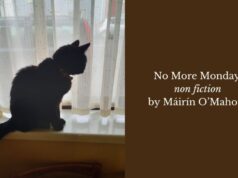
BOOKS IRELAND FLASH FICTION
The Folly, by Sheena Power
Jonathan Fairley survived the war, grimy with memories of slaughter.
He survived the journey home, too. Separated from comrades, without money or papers to prove who he was, he trudged and worked and traded his way to Lisbon, and sailed beside peasants to Kinsale. There, for the first time in two years, he saw recognition in another man’s eyes, and felt he would cry at the warmth of it, just to be known, to be hailed by his name.
Captain Mannix stared long at him, even as he clasped his arm and led him to an easy chair, and put a glass of wine in his hand.
“They said you were dead,” Mannix said at last.
“Were my family told so?” Fairley asked.
“They were.” A heavy pause. “They are building… a folly to your memory.”
As the idea settled into his mind that to his family he was dead, had been dead some time, Jonathan Fairley began to have a curious feeling. Travelling homeward he felt that a ghost rode with him—his own ghost.
It jeered the living Fairley with the praises of epitaphs. A loving husband, a dear son. The dead Jonathan Fairley was valorous and romantic, and his family poured their grief into stone for him – a sombre, dignified memorial.
But what was that memorial when Fairley turned up, still alive, halfway through its construction? What was dignified became ridiculous.
He saw it too soon, though he’d been scanning the horizon for miles. Unfinished but already twenty feet high, stone dark in the damp air.
They must have started building it months ago. All that time, as he struggled across Europe, his dead doppelgänger had flown weightlessly before him, to set up residence at his family home.
He even knew what the ghost looked like, for Sarah, at least. It resembled the miniature
he had given her on their wedding, which even at the time he had thought absurdly flattering. And now he was grown even farther from its ideal, lined and aged by war and rough living.
To his mother the ghost was no doubt her little son, the one she had pined for as he disappeared into manhood. And to his father the ghost was a brave soldier, and all their
squabbles over the management of the farm were forgotten.
Jonathan Fairley approached the house, despairing of how he would evict the ghost that haunted it. They hurried out to greet him, Sarah, his mother, his father. His mother took his bearded face in her hands, gazed at him and kissed him, his father laughed and cried. Sarah put her face against his shoulder and stayed there, her shoulders
shaking.
The Fairleys have all gone now, and even their descendants. The house crumbled away and the fields are bramble and thistles. Only the folly remains, abandoned twice over.
The doppelgänger haunts it, gloomy and spiteful.
Sheena Power is an artist by day but has always loved writing. The Folly was inspired by the Ponsonby Tower in Kilkenny, which was begun by the grieving Third Earl of Bessborough in memory of his son, and was left unfinished when Frederick Ponsonby returned home in 1815.












